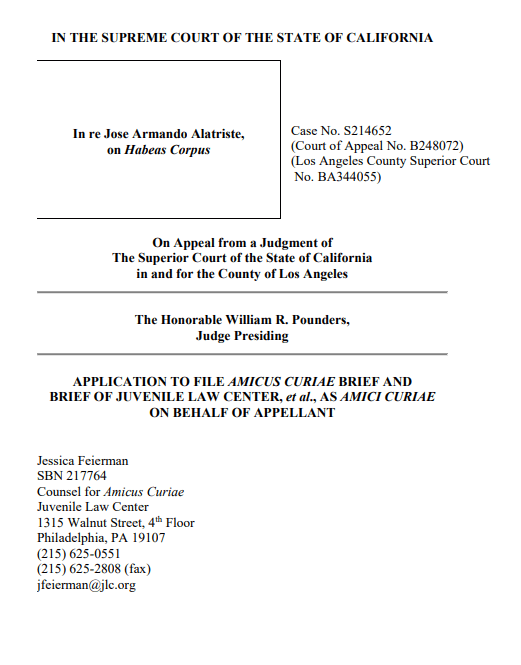
Summary of Argument
In Miller v. Alabama, 132 S. Ct. 2455 (2012), the United States Supreme Court held that the mandatory imposition of sentences of life without the possibility of parole on juvenile offenders convicted of murder is unconstitutional. The Court required that before a juvenile homicide offender can receive a sentence that offers no “meaningful opportunity to obtain release,” id. at 2469 (quoting Graham, 560 U.S. 48, 75 (2010)), the sentencing court must have discretion in sentencing and must consider the defendant’s youth and its accompanying characteristics.
Appellant Jose Armando Alatristre was sentenced to 77 years to life for a crime he committed as a juvenile. Because Appellant’s sentence deprives him of a “meaningful opportunity to obtain release,” it is the functional equivalent of life without parole. The sentencer did not consider Appellant’s age or the age-related factors required by Miller; therefore, the imposition of functional life without parole on Appellant is unconstitutional.
Miller’s prohibition on mandatory life without parole applies retroactively to the Appellant. Miller announced a substantive rule, which pursuant to U.S. Supreme Court precedent applies retroactively. Further, even assuming the rule is procedural, Miller is a watershed rule of criminal procedure that applies retroactively. Moreover, Miller must be applied retroactively because, once the Court determines that a punishment is cruel and unusual when imposed on a child, any continuing imposition of that sentence is itself a violation of the Eighth Amendment; the arbitrary date of sentencing cannot convert an otherwise unconstitutional sentence into a constitutional one.